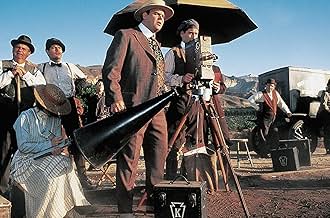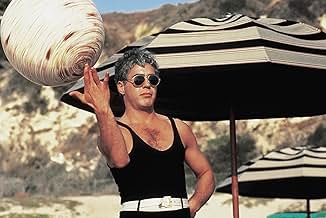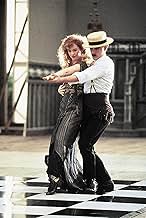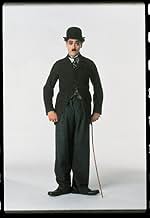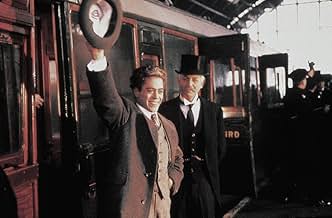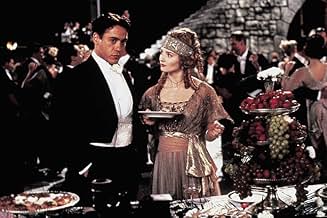VALUTAZIONE IMDb
7,5/10
64.578
LA TUA VALUTAZIONE
La vita travagliata e controversa del regista di commedie Charles Chaplin.La vita travagliata e controversa del regista di commedie Charles Chaplin.La vita travagliata e controversa del regista di commedie Charles Chaplin.
- Regia
- Sceneggiatura
- Star
- Candidato a 3 Oscar
- 3 vittorie e 20 candidature totali
Deborah Moore
- Lita Grey
- (as Deborah Maria Moore)
Recensioni in evidenza
Robert Downey, Jr. gives another one of his splendid performances, Kevin Kline is perfectly cast as Fairbanks, and most of the direction is superb. However, the story hops around a few too many times, and the scenes with Anthony Hopkins are weak and obviously placed in order to clarify things to non- Chaplin fans who watch the film. Overall it is enjoyable, especially the parts when we see him creating his well- known masterpieces. Recommended especially for movie fans, and most especially for Chaplin fans.
Chaplin isn't really a great bio-pic, but there are moments when Richard Attenborough's direction shines and it's consistently got an amazing Robert Downey Jr. performance as the title character. In fact, this is the kind of movie where the lead actor is so important that some of the major enjoyment and success of the film rests on him/her, oddly enough since it is a varied and superlative ensemble. There are moments when Attenborough's grandiosity gets in the way, and the moments that mark it as being somewhat conventional. What made me pleasantly surprised is what Attenborough *did* decide to show with Chaplin the private man; I thought that he would cut out much of the stuff with Chaplin's penchant for young (usually underage) girls, or some of the things regarding his mother, but most of the notorious facts are put in for good measure to counter-balance some of the pompous, though fascinating, scenes of "cinematic history."
Now as a fan of Chaplin's films and the given acknowledgment that he's one of the most talented comic actors and filmmakers of the 20th century, I do get a little choked up seeing that final clip-show at the Oscars of great clips from his most famous movies. And it's interesting always, from just a movie-buff stand-point, to watch the history behind Chaplin's transition from vaudeville to Max Senett's film company to slowly becoming an independent and world-famous auteur/star. But for the most part the writing and the direction make it entertaining just on that conventional, rise-fall-rise-fall-struggle-success-at-end story with maybe less drugs and a bit more politics than one might usually see (save for one fantastic scene when Chaplin and his brother and friends are sneaking around the film footage of The Kid from the brass who want it for tax purposes).
What makes it almost outstanding, however, is Downey Jr. He's funny as Chaplin when he needs to show how he was a great clown (i.e. the 'old-drunk' bit), he's melancholy when needed, he plays Chaplin as young, middle-aged, and old perfectly, and there's just the slightest details that keep you glued to the screen to see what he'll do next. It's not exactly a breakthrough role as he'd been doing some really good work intermittently in the late 80s, but this is the one that got him recognition by the likes of the Academy, and rightfully so. It's masterful work in a decent tribute to Sir Charles "Tramp" Chaplin, and should delight those looking for a good ensemble and a commanding lead performance.
Now as a fan of Chaplin's films and the given acknowledgment that he's one of the most talented comic actors and filmmakers of the 20th century, I do get a little choked up seeing that final clip-show at the Oscars of great clips from his most famous movies. And it's interesting always, from just a movie-buff stand-point, to watch the history behind Chaplin's transition from vaudeville to Max Senett's film company to slowly becoming an independent and world-famous auteur/star. But for the most part the writing and the direction make it entertaining just on that conventional, rise-fall-rise-fall-struggle-success-at-end story with maybe less drugs and a bit more politics than one might usually see (save for one fantastic scene when Chaplin and his brother and friends are sneaking around the film footage of The Kid from the brass who want it for tax purposes).
What makes it almost outstanding, however, is Downey Jr. He's funny as Chaplin when he needs to show how he was a great clown (i.e. the 'old-drunk' bit), he's melancholy when needed, he plays Chaplin as young, middle-aged, and old perfectly, and there's just the slightest details that keep you glued to the screen to see what he'll do next. It's not exactly a breakthrough role as he'd been doing some really good work intermittently in the late 80s, but this is the one that got him recognition by the likes of the Academy, and rightfully so. It's masterful work in a decent tribute to Sir Charles "Tramp" Chaplin, and should delight those looking for a good ensemble and a commanding lead performance.
This is a great example of a movie I took a chance on one rainy Sunday at a theater in Charlotte, NC., and was highly rewarded with an intriguing look at the life of an early film star set against the background of early Hollywood. I had't heard much buzz about it and didn't really know much about Charlie Chaplin. Downey is amazing in his personification of Chaplin. If you want to expand your horizons and learn a little about the inside workings of the film industry from circa World War I thru the 50's, this award-winning movie comes highly recommended.
The first thing one should know about "Chaplin" is that, paradoxically, very little of it has to do with Chaplin. Or, at least, it has more to do with the writers' illusions of him. The film claims to be based on "My Autobiography" and on "Chaplin: His Life and Art", by David Robinson. Having re-read the Autobiography before watching the film, it is clear to me that what the writers did was take basic incidents from the autobiography and embellish them with, I can only assume, parts of the Robinson book. What results is a series of scenes which were vaguely influenced by the facts, but so simplified and primitive that little of the original truth remains.
What the writers did not wish to acknowledge was that when Chaplin wrote vaguely or skimmed past certain parts of his life, he really didn't want anyone to delve into them - and the filmmakers did just that. "Chaplin" is not really about Charlie Chaplin, his work and films. It is simply ceaseless speculation on his personal life, but going on even more vaguely about it than the Autobiography.
I am well aware that almost every biopic focuses more on the personal life of a person than on their work. The problem is that most of the characters in "Chaplin" are so exaggerated and simplified that they become almost completely unbelievable - both as the real people AND as fictional characters. None of them are fully developed. This is not entirely the fault of the supporting cast (although it really is not that interesting): the fault lies with the screenplay, which is too often bland and melodramatic. This is especially obvious in the ridiculous subplot concerning the older Chaplin and his editor, which is the most pointless and badly done part of the film; even Hopkins cannot make the lines sound credible, which is all the proof anyone needs of their mediocrity. The film would have worked immeasurably better without these additions.
Many of the most interesting aspects and parts of Chaplin's life are completely ignored, oddly, with seemingly irrelevant or less important stories added in for little reason. One scene in particular is added only to insert a Chaplin-esquire physical comedy sequence which falls flat. The writers greatly accentuated everything to do with Hetty Kelly, even making the same actress play Oona O'Neill; the tried too hard to give him some kind of motive for his relationships, which only leads to more bias and speculation; and although I am by no means a Chaplin purist or even a very knowledgeable admirer, the blatant alterations on the actual history grated on my nerves.
All this being said, the film is certainly not a terrible one. Mainly, however, this is for one reason only, and that is - yes - Robert Downey Jr. himself. The praise he received for the role is by no means undeserved. As Chaplin he is perfect, managing to make the best out of his rather predictable lines, remaining interesting, believable, and in many parts moving. He has wonderful timing and intensity, and even looks the part (he could even do the roll dance). I really quite believed he was Chaplin. Even his performance, however, suffers greatly because of the lines - and the flash-forwards. I have no doubt that he could have played an even better Charlie Chaplin in a differently made film.
The greatest scene in "Chaplin", I think, is the opening credits: Charlie arrives in his dressing room, alone, sits, and begins to remove his make-up. The scene is in black and white, and there is no dialogue - only music. Every emotion is expressed simply through his eyes. If the rest of the film had been made like this, I actually think it could have been perfect. Either way, the lead performance is astounding, the music is beautiful, and though not very insightful or too true to history, this film is well worth watching.
What the writers did not wish to acknowledge was that when Chaplin wrote vaguely or skimmed past certain parts of his life, he really didn't want anyone to delve into them - and the filmmakers did just that. "Chaplin" is not really about Charlie Chaplin, his work and films. It is simply ceaseless speculation on his personal life, but going on even more vaguely about it than the Autobiography.
I am well aware that almost every biopic focuses more on the personal life of a person than on their work. The problem is that most of the characters in "Chaplin" are so exaggerated and simplified that they become almost completely unbelievable - both as the real people AND as fictional characters. None of them are fully developed. This is not entirely the fault of the supporting cast (although it really is not that interesting): the fault lies with the screenplay, which is too often bland and melodramatic. This is especially obvious in the ridiculous subplot concerning the older Chaplin and his editor, which is the most pointless and badly done part of the film; even Hopkins cannot make the lines sound credible, which is all the proof anyone needs of their mediocrity. The film would have worked immeasurably better without these additions.
Many of the most interesting aspects and parts of Chaplin's life are completely ignored, oddly, with seemingly irrelevant or less important stories added in for little reason. One scene in particular is added only to insert a Chaplin-esquire physical comedy sequence which falls flat. The writers greatly accentuated everything to do with Hetty Kelly, even making the same actress play Oona O'Neill; the tried too hard to give him some kind of motive for his relationships, which only leads to more bias and speculation; and although I am by no means a Chaplin purist or even a very knowledgeable admirer, the blatant alterations on the actual history grated on my nerves.
All this being said, the film is certainly not a terrible one. Mainly, however, this is for one reason only, and that is - yes - Robert Downey Jr. himself. The praise he received for the role is by no means undeserved. As Chaplin he is perfect, managing to make the best out of his rather predictable lines, remaining interesting, believable, and in many parts moving. He has wonderful timing and intensity, and even looks the part (he could even do the roll dance). I really quite believed he was Chaplin. Even his performance, however, suffers greatly because of the lines - and the flash-forwards. I have no doubt that he could have played an even better Charlie Chaplin in a differently made film.
The greatest scene in "Chaplin", I think, is the opening credits: Charlie arrives in his dressing room, alone, sits, and begins to remove his make-up. The scene is in black and white, and there is no dialogue - only music. Every emotion is expressed simply through his eyes. If the rest of the film had been made like this, I actually think it could have been perfect. Either way, the lead performance is astounding, the music is beautiful, and though not very insightful or too true to history, this film is well worth watching.
Thankyou to Richard Attenborough for this film. I watched it many a time and enjoyed both the biographical aspect and the comedic one but it has also increased my interest in silent comics of this great era.
The film begins by exploring the early life of Charlie, his Brother Sid and his Mother as they try to scrape a living. Thankfully Attenborough doesn't concentrate too much on this deprived part of Chaplin's life. However it does reveal interesting facts about Charlie that he never forgot during his rise to superstardom.
Although Chaplin is played by younger actors at the begining it is the arrival of Robert Downey Jnr which Chaplin fans will anticipate the most. He puts in an amazing performance, his London accent is excellent and ability to do slapstick even better he also really makes you believe that the great man is alive and on the screen again.
The film rightly concentrates on the private life of Chaplin and the development of the cinema. Whilst others may want to see the film concentrate on Chaplin's great pictures e.g The Kid, Gold Rush, and the Great dictator Attenborough blends the creation of these films into specific turning points in Charlie's life. For example Modern times is used to show Chaplin's sympathy towards victims of the wall street crash, as he knew what it was like to be extremely poor. His Jewish connections are also highlighted by the Great dictator, which shows his sensitivities to the European Jews were more at heart than just a making a heap of cash by having a laugh at Hitler's moustache and goose stepping troops.
The film doesn't get bogged down by Chaplin's hectic love life, as Dickie explores Charlie's political beliefs and how J Edgar Hoover was convinced of he was a communist party member. By doing so it shows how Hoover was one of the most twisted individuals to hold public office, with a dangerous obsession on peoples private lives and background.
The film does a good job in showing how important silent stars were and how we should not forget that they were the true greats when films were developing all the time from shorts to feature length, from silent to sound.
The film begins by exploring the early life of Charlie, his Brother Sid and his Mother as they try to scrape a living. Thankfully Attenborough doesn't concentrate too much on this deprived part of Chaplin's life. However it does reveal interesting facts about Charlie that he never forgot during his rise to superstardom.
Although Chaplin is played by younger actors at the begining it is the arrival of Robert Downey Jnr which Chaplin fans will anticipate the most. He puts in an amazing performance, his London accent is excellent and ability to do slapstick even better he also really makes you believe that the great man is alive and on the screen again.
The film rightly concentrates on the private life of Chaplin and the development of the cinema. Whilst others may want to see the film concentrate on Chaplin's great pictures e.g The Kid, Gold Rush, and the Great dictator Attenborough blends the creation of these films into specific turning points in Charlie's life. For example Modern times is used to show Chaplin's sympathy towards victims of the wall street crash, as he knew what it was like to be extremely poor. His Jewish connections are also highlighted by the Great dictator, which shows his sensitivities to the European Jews were more at heart than just a making a heap of cash by having a laugh at Hitler's moustache and goose stepping troops.
The film doesn't get bogged down by Chaplin's hectic love life, as Dickie explores Charlie's political beliefs and how J Edgar Hoover was convinced of he was a communist party member. By doing so it shows how Hoover was one of the most twisted individuals to hold public office, with a dangerous obsession on peoples private lives and background.
The film does a good job in showing how important silent stars were and how we should not forget that they were the true greats when films were developing all the time from shorts to feature length, from silent to sound.
Lo sapevi?
- QuizGeraldine Chaplin played her real-life paternal grandmother Hannah Chaplin.
- BlooperWhen Charlie is shown at the 1972 Oscars near the end of the movie, he is showed being brought to the podium in the wheelchair and then standing at the podium as the movie clips played. In the actual awards ceremony, Charlie walked out to the podium under his own power after the clips ended.
- Citazioni
German Diplomat: [offering his hand] Mr. Chaplin! I am a great admirer of yours.
Charlie Chaplin: I'm sorry, I prefer not to shake hands with Nazis.
German Diplomat: [laughs nervously] What have you got against us, Mr. Chaplin, hm?
Charlie Chaplin: What have you got against everybody else?
- Curiosità sui creditiThe film ends with the final scene of Il circo (1928): Charlie Chaplin walks off into the distance.
- Versioni alternativeTo receive a 12 certificate the original UK cinema version was cut to remove one use of 'fucking' (during Charlie's homecoming visit to a pub). Later releases were uncut and upgraded to a 15 rating.
- ConnessioniFeatured in Friday Night: Episodio #1.11 (1992)
- Colonne sonoreThe Honeysuckle and The Bee
Written by Albert Fitz and William H. Penn (as William Penn)
I più visti
Accedi per valutare e creare un elenco di titoli salvati per ottenere consigli personalizzati
- How long is Chaplin?Powered by Alexa
Dettagli
- Data di uscita
- Paesi di origine
- Siti ufficiali
- Lingue
- Celebre anche come
- Chaplin
- Luoghi delle riprese
- Aziende produttrici
- Vedi altri crediti dell’azienda su IMDbPro
Botteghino
- Budget
- 31.000.000 USD (previsto)
- Lordo Stati Uniti e Canada
- 9.493.259 USD
- Fine settimana di apertura Stati Uniti e Canada
- 84.669 USD
- 27 dic 1992
- Lordo in tutto il mondo
- 9.493.259 USD
- Tempo di esecuzione
- 2h 23min(143 min)
- Colore
- Proporzioni
- 1.85 : 1
Contribuisci a questa pagina
Suggerisci una modifica o aggiungi i contenuti mancanti



